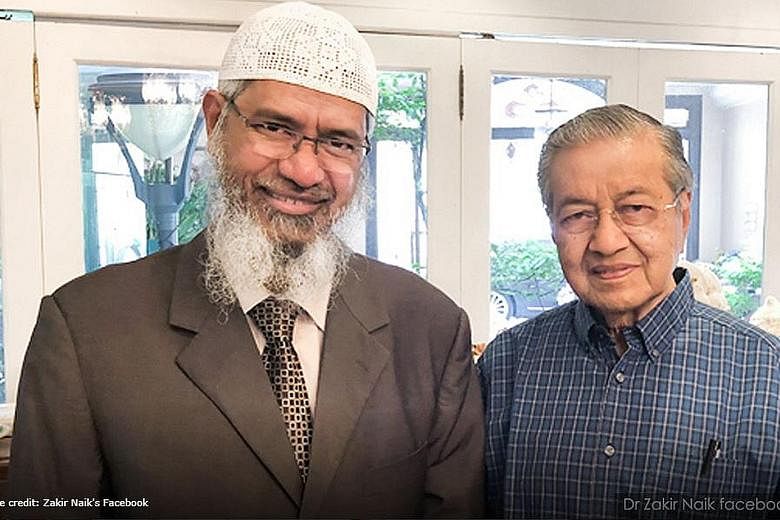A tussle between India and Malaysia over the extradition of controversial Islamic preacher Zakir Naik has cast a cloud on bilateral ties.
Malaysian Prime Minister Mahathir Mohamad on July 6 ruled out sending Dr Naik to India, arguing that he could become a "victim".
"We do not easily follow the demands of others. We must look at all factors before we respond," the New Straits Times quoted him as saying.
In January, New Delhi lodged a formal request with the Malaysian government to extradite Dr Naik to India to face charges of inciting and financing terrorism and promoting enmity between different religious groups.
Tun Dr Mahathir's refusal came a day after the spokesman for the Indian Ministry of External Affairstold the media that its "request is under active consideration on the Malaysian side".
Dr Naik left India in July 2016, soon after he found himself under increased scrutiny following reports that at least two of the terrorists behind the attack on Holey Artisan Bakery cafe in Dhaka the same month were "inspired" by him.
-
From doctor to 'rock star televangelist'
-
Born in 1965 in Mumbai, Dr Zakir Naik has gained international prominence as a "rock star televangelist" with his sermons delivered in English and frequent references to extracts quoted from Islamic scriptures.
Critics say his sermons portray a fundamentalist picture of Islam that relies on a rejection of other faiths or promotes Islam as superior to other religions.
He has also recommended the death penalty for homosexuals and for those who leave the faith.
A medical doctor, he founded the Islamic Research Foundation in 1991 that owns and beams his popular Peace TV channel, through which he reaches a reported 200 million viewers.
The channel is broadcast in English and Urdu. It also ran a Bengali version, which was banned by Bangladesh in 2016.
India banned the channel in 2012, with the Indian authorities growing wary of its propagation of the Wahhabi school of Islam.
Several countries, including Singapore and Britain, have banned his entry.
In India, he faces charges of inciting and financing terrorism and promoting enmity between different religious groups. He again denied the charges in a statement released last Monday.
The charismatic preacher is living in Malaysia, where he has been granted permanent resident status. Bringing him back to face justice is important for the Narendra Modi-led government, which has taken a strong stance on terrorism-related issues.
This episode is a rare bump in otherwise rapidly progressing ties, underpinned by strong diaspora links, between India and Malaysia. India is one of Malaysia's top 10 trading partners, with bilateral trade valued at more than US$13 billion (S$17.8 billion).
The two countries have also been engaging closely in the defence sector, and demonstrated a shared strategic vision to maintain open seas and freedom of navigation in their neighbourhoods.
Prime Minister Modi was among the first foreign leaders to have met Dr Mahathir when he made a short stopover in Kuala Lumpur in May to congratulate his Malaysian counterpart on his electoral win earlier the same month. Some reports suggested that Dr Naik's extradition was discussed on this visit.
The two countries have also been cooperating closely on counter-terrorism since they announced a strategic partnership in 2010. Malaysia has deported six individuals accused of supporting Khalistani terrorism.
Many analysts in India believe the issue of Dr Naik's extradition is still on the table.
Mr K.P. Nayar, a veteran foreign affairs writer and commentator, suggested that the growing transactional element in Indo-Malaysian ties could still push the two countries to work out a possible deal. "It can come in lieu of India buying more palm oil and arms, or increased investment in each other's country," he said.
Ms Veena Sikri, who was India's high commissioner to Malaysia from 2000 to 2003, said an extradition request is a "complex matter" and made "with great seriousness".
"When a government makes a serious request, it naturally expects the other government to take it seriously. So, while it seems that Malaysia is still considering India's request in keeping with its laws, any refusal will certainly have an impact on bilateral ties," she told The Sunday Times.
"I, however, do not see any finality one way or the other at this stage as an extradition is a long, drawn-out process," she said.

